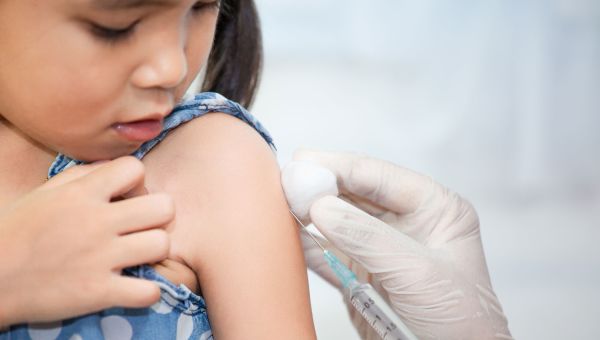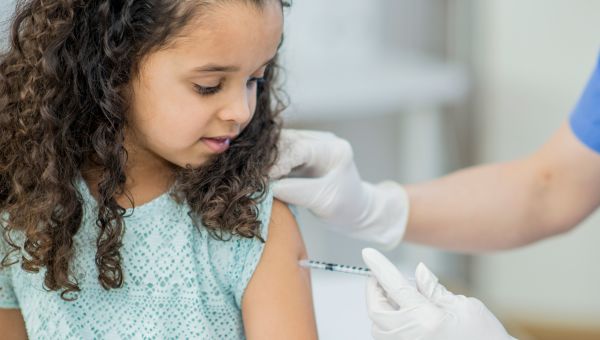Hawaii Health Alert: 6 Myths That Aren’t True You Need to Know About Vaccines
No, immunizations aren't linked to autism.

The number of Hawaii’s kindergartners who are unvaccinated is on the rise. In the 2014-15 school year, there were 754 unvaccinated kindergartners who received religious exemptions, compared to 634 the year before. Due to inadequate school reporting to the Hawaii Department of Health, it is unclear how many kindergartners have gone unvaccinated during the 2018-19 school year, as well as the overall vaccination rate at schools in the state.
Hawaii allows vaccine exemptions for two reasons: medical and religious. While the state does not allow philosophical exemptions, the religious exemptions can be applied so broadly that most parents who do not wish to vaccinate are able to opt out.
Staying up to date with your child’s immunizations is an important part of keeping kids—and their peers—safe from life-threatening infectious diseases. Here's the truth behind six of the most common immunizations myths.

Myth #1: Vaccines cause autism
Even the largest and most in-depth studies have yet to prove a connection between vaccines and autism.
In 1998, former doctor Andrew Wakefield published a fraudulent study in The Lancet linking the measles, mumps and rubella (MMR) vaccine to autism. The study was widely discredited and retracted from publication, while Wakefield was barred from practicing medicine in the United Kingdom. Regardless, some still believe the connection.
In the years since, numerous studies from major organizations, including the World Health Organization, have shown that childhood vaccines are safe. In fact, a February 2017 study published in Nature suggests brain changes related to autism begin in early infancy, before a child would be given the MMR vaccine.

Myth #2: Childhood vaccines contain mercury (thimerosal)
Thimerosal, a mercury-based preservative, was removed from all childhood vaccines in 2001, according to the Centers for Disease Control and Prevention.
Thimerosal had been used to prevent the buildup of dangerous bacteria in vaccine vials. Aside from potential to cause redness at the injection site or, rarely, allergic reactions, there’s no evidence that thimerosal caused harm, even before it was removed.
It isn't the same risky kind of mercury found in certain fish (methylmercury) and it has absolutely no link to autism. In fact, thimerosal was never even in the MMR vaccine, which was the focus of Wakefield’s debunked autism study.
Today, the flu shot is the only vaccine available to kids that could contain thimerosal, but not all versions have it.

Myth #3: Vaccines aren’t necessary
Vaccines prevent between two and three million global deaths every year, according to the World Health Organization—and an additional 1.5 million deaths could be avoided if vaccine coverage improved. Not only do immunizations help the body build a resistance to potentially fatal infectious diseases, they make a person less likely to pass those illnesses to someone else. Vaccines have virtually eradicated disease like polio and diphtheria, but we'd be remiss to think they won't reappear without continued immunizations.
Unvaccinated children and adults can spread disease to those who are too young or too medically fragile to be immunized. That means missing even one shot could not only endanger a person’s life, but the lives of those around them.

Myth #4: Vaccines cause sudden infant death syndrome (SIDS)
In 2003, the Institute of Medicine examined the relationship between SIDS and DTwP, DTaP, HepB and polio vaccines, as well as specific combinations of inoculations. Review results suggested no association between immunizations and childhood deaths. Subsequent studies haven’t found a link, either.
Perhaps the myth began as a result of pure coincidence. Most cases of SIDS occur in infants younger than 12 months, and children can receive as many as 15 vaccinations in the first year of life.

Myth #5: It’s not safe to give multiple childhood vaccines at one time
Evidence shows that’s not the case. Both the Advisory Committee on Immunization Practices and the American Academy of Pediatrics recommend kids receive several routine vaccines at once, as long as they have a healthy immune system.
A 2018 study published in The Journal of the American Medical Association (JAMA), suggests the delivery of multiple vaccinations does not negatively affect an infant’s immune system. The study assessed hospital visits of 944 children between the ages of 24 and 47 months who had received recommended vaccinations during their first 23 months. Research suggested early vaccinations did not lead to an increased risk of getting infections unrelated to the vaccines (such as respiratory or gastrointestinal infections).
Giving a child simultaneous vaccines, as well as combined vaccines, has its advantages, including fewer trips to the doctor’s office and a higher likelihood of completing recommended vaccines on schedule.

Myth #6: Only kids need vaccines
If you thought vaccines were only for little ones, think again. Experts estimate more US adults die of vaccine-preventable diseases than from prostate cancer or car accidents. Here’s a rundown of the vaccines you may need as an adult:
- Influenza: The flu shot is recommended for people six months and older.
- Tdap: Adults need one shot of tetanus, diphtheria and pertussis vaccine (Tdap), followed by a Td or Tdap booster every 10 years.
- Zoster: The shingles vaccine is now recommended for adults 50 years and older.
- Pneumococcal: The pneumonia vaccine is recommended for adults 65 and older, and earlier for people with certain risk factors.
Certain adults may also need vaccines for meningitis, hepatitis, chickenpox, human papilloma virus (HPV) and other conditions. Talk with your doctor about which adult vaccines you may need.
The bottom line: Vaccines save lives.
This article was updated on March 1, 2019.
More On


video

article


video


video


video
